- Home
- Dirk Patton
V Plague (Book 11): Merciless Page 8
V Plague (Book 11): Merciless Read online
Page 8
As we rolled up, I noted a long runway carved into the ice, a couple of maintenance and equipment sheds located next to it. Beyond was a large area devoted to a variety of antennas, including a large radome for what I assumed was a Doppler radar system. Then we drove into a cavernous, metal sided garage and I lost sight of the exterior of the camp.
The people living and working in the shadow of the North Pole probably weren’t used to visitors dropping in unannounced, especially after the end of the world. When I was escorted across a long, snow covered path and into the common area, nearly all of them were waiting to see me. I guess someone had called ahead.
The Captain was the senior military officer present, and though I could tell he didn’t much care for my presence at his station, he played the good host and introduced me to the more senior personnel. One of the scientists pointed a laser thermometer at me rather than extending his hand to greet me.
“He’s clear,” he said to those gathered around him.
“What was that?” I asked.
“Checking for indication of infection,” he answered.
“I’ve been vaccinated,” I said, greeted with shocked expressions all around.
“There’s a vaccine?”
A woman close to my age stepped closer as she asked the question in surprise. I’d already been introduced to her, but couldn’t remember her name.
“Yes,” I said, realizing that much of the information I knew had never been broadcast in a manner that they could have intercepted. “I guess there’s a lot to tell you.”
“Quite,” she said, a slight British undertone to her accent.
“First,” I turned to Captain Dumas. “When is that plane due to arrive?”
“Eight hours,” he replied.
“Well, I think I have a lot to tell you,” I said, removing the parachute canopy and a layer of clothing that wasn’t needed inside the heated station. “Before I start, can I use your comm gear to let Pearl Harbor know I’m alive and kicking?”
“They have already been notified,” Captain Dumas said. “I am most anxious to hear what you have to say. I believe we may still have some coffee.”
He turned and led the way down a narrow hall, then through a door into a relatively spacious cafeteria. My stomach growled loudly when the smells of food being prepared reached me. I asked my host for something to eat and was pointed at a serving line.
I couldn’t remember the last time I’d eaten, and piled a tray with powdered eggs, freeze dried sausage and freshly baked biscuits. Everything was bland, but it still beat an MRE any day of the week.
Sitting at a long table, I dug in as the Captain, a Warrant Officer and several of the scientists joined me. The WO was the most senior non-commissioned officer at the station, and second in command of the military personnel. While I ate, he took it upon himself to share a bit of the history of CFS Alert.
Alert was first opened in the early 1950s as a weather station. Part of the Joint Arctic Weather Station (JAWS) System. In1958, it began operating as a signals intelligence unit of the Canadian Forces.
Canadian Forces personnel and Department of the Environment employees make up the entire population of CFS Alert. They also maintain a geolocation capability and High Frequency Direction Finding (HFDF) facilities to support search and rescue as well as military operations in the Arctic.
During the Cold War, Alert was strategically important because of its proximity to the Soviet Union. It is the closest point in North America to the northwestern area of the Soviet Union. In fact, Alert is closer to Moscow than it is to Ottawa. He said the last with a note of pride in his voice.
By this time, I had cleaned my plate and was gratefully cradling a steaming mug of coffee in my hands. The feeling was just starting to return, and they hurt like hell, but I forced myself to endure the pain and continue to warm them.
“You mentioned a vaccine,” the female scientist prompted.
I nodded and began speaking. Told them everything I knew about the nerve gas-virus combination. Talked about the vaccine the Russians had used to protect their population from infection and how it had been given to us by a defector. When I was done, I stood up and refilled my cup before resuming my seat. The scientists were full of questions, but I couldn’t answer most of them. The ones I did, I wasn’t able to provide the specifics they were looking for.
“What about you?” Dumas asked when there was a lull in the questions. “Why were you on a Russian plane on your way to Moscow?”
“It’s a really long story,” I said with a sigh.
“It appears that we have plenty of time,” he said, raising his eyebrows expectantly.
Frankly, I was getting a little tired of telling my story. I’ve never been a big talker, preferring action to dialogue, but these people had just saved me from certain capture or death. Two of them had died in the process. They’d fed me, and despite being somewhat annoying, were treating me well. I figured it was the least I could do to repay them for their help.
So I launched into my tale. Started at the beginning, in Atlanta. When I talked about Rachel, the pain at the thought of losing her threatened to twist my guts into a knot. But I pushed ahead, describing everything I’d been through and being honest about why the Russians wanted me.
“Bloody hell,” the woman scientist said when I finished.
I nodded, looking around at the faces watching me. Many of them reflected my own sense of loss.
“How is it you’ve managed to escape notice this long?” I asked, wanting to change the subject.
“We’ve been very careful about transmitting any signals,” Dumas answered. “Immediately after the attacks, we repeatedly tried to reach anyone who could tell us about conditions at home. For a while, we were in communication with our chain of command, headquartered in Montreal, but in slightly less than two weeks they went silent.”
“That’s about right for the incubation period for the first outbreak of the virus,” I confirmed. “The nerve gas release was devastating, but for a while there it seemed as if the survivors would be able to hold out. Then a widespread outbreak hit. Followed by another. A total of three, I think. I remember someone commenting that it depended on the person. Some resisted for longer than others.”
The group seated at the table with me looked around at each other, fresh expressions of horror on their faces.
“Are there any survivors in Canada?” A man at the far end of the table asked.
I looked at him for a beat, then glanced around before answering.
“The world is dead,” I said, forcing myself to meet their eyes. “The virus spread incredibly fast. It’s jumped to animals, too. Birds and swine for sure, maybe other species. I don’t know. As far as I know, only Australia has survived because of how geographically isolated they are. Hawaii was intact, before the Russians nuked them, and there were about 30,000 survivors evacuated to the Bahamas.”
“That’s all that’s left?” Another researcher blurted.
“I’m sorry to tell you, but as far as I know, yes. If someone wasn’t infected by the virus, they were killed by someone who was. I suspect there’re a few other places like this with survivors, but there can’t be many. What I do know is there isn’t home anymore.”
There were more shocked expressions, and several people began softly crying.
“We knew it was bad,” the WO quietly said. “We had no idea it was this bad.”
I didn’t know what to say to that. Sitting there telling them that everything in the world they cared about was gone wasn’t something I wanted to do. But not telling them the cold, hard facts wasn’t right. They needed to know. Looking around, a thought occurred to me.
“How are your supply levels?”
I didn’t know a lot about remote stations in the Arctic or Antarctic, but I did know that they were completely dependent upon resupply deliveries of just about everything except maybe water. There was a brief, uncomfortable silence.
“We are in minima
l consumption mode,” Captain Dumas said. “In fact, you just ate three days’ worth of rations.”
I stared at him in surprise, feeling guilty. If I’d known, I would have managed to restrain myself.
“What’s your plan?” I asked.
“Hunting,” he said, simply. “Seals can be found a few kilometers to the south. Not far from where we picked you up. But it can be rather treacherous as there are polar bears about.”
“Polar bears?” I asked in surprise.
“You’re rather fortunate you didn’t encounter one,” he said. “They’re quite nasty tempered and will attack anything they encounter.”
“You’ve got vehicles,” I said. “Aren’t there any towns farther south?”
“No. The entire island is uninhabited other than three stations, of which we are one. Of the three, Alert is the only that is permanently occupied. Eureka and Grise Fiord are the other two, but both were shuttered for the coming winter when the attack occurred.
“We would normally receive a resupply flight every six weeks. Food, fuel, medical and a few luxuries. Personnel moving in and out. We rotate our stores, keeping an eight week supply on hand at all times. But we’ve now missed our third flight and the cupboard is growing rather bare.”
“It’s not all bad,” the female scientist smiled. “I’ve lost five kilos in the past month.”
A subdued chuckle passed around the room and I suspected this had become a running joke. Gallows humor.
“Why didn’t you contact Pearl Harbor? Ask for help?”
“We tried. Several times,” Dumas shook his head. “But all of the encrypted channels we had always used to communicate with the American military went unanswered. We thought about transmitting in the clear, but were concerned over alerting the Russian Navy to our presence. We have been monitoring many channels, and decided it best to stay undetected.”
“Now that we know you’re here, supplies can be sent,” I said.
“We asked when we notified them you had been picked up,” he said.
“And?”
“And were told that as soon as it can be arranged, we would be contacted.”
“That’s bullshit,” I said. “Who did you talk to?”
“A Lieutenant in Hawaii named Stinson. He seemed less than interested in our plight,” Dumas said.
“Captain,” I said, standing. “If there’s one thing you need to know about the American military, it’s that you have to talk to the right person. And I happen to know the right person to get you some help. If you’ll take me to your radio room, I’ll be happy to have that conversation.”
13
“Lieutenant, you have about three seconds to put me through to Admiral Packard,” I growled into the headset microphone I was wearing. “Am I clear?”
“Hold one, sir,” the young sounding officer replied.
I was sitting in Alert’s comm center, having been escorted there by Dumas and the WO, who was named Skelling. The Captain had ordered one of the operators to put me in touch with Hawaii, a moment later a bulky headset being handed to me.
“Major, it is truly good to hear your voice again,” Packard said a few minutes later. “But I’m neck deep in a shooting war with the Russians. What did you need to speak with me about?”
“I’m sorry to interrupt, sir, but I’m the guest of a small group of Canadians that are about to starve to death. They haven’t had a resupply flight in several months, and weren’t getting a lot of help. I’m hoping you can provide some motivation.”
“Major, right now I’m doing everything I can to keep the million residents of Oahu from being vaporized by an enemy missile. We’re stretched beyond thin. There just aren’t resources available.”
“There’s a plane coming for me,” I protested.
“Yes, and only because it was a flight bound for the Bahamas. They were rerouted when we learned your plane went down. Fortunate for them as the island was struck and we lost all personnel to a Russian missile.
“There’s room on the plane, Major. If the Canadians want to evacuate with you, we’ll take them in. Otherwise, it may be some time, if ever, before we’re able to coordinate a supply mission. Now, I have to go. Good to have you back.”
There was click and the circuit went dead. I pulled the headset off and nearly threw it in frustration. Looking up, I met Dumas’ eyes and knew he could tell how the conversation had gone.
“Not good news, was it,” he said.
“The war is taking all of our resources,” I said. “The plane coming for me was on its way to the Bahamas. It was diverted at the last minute.”
“Maybe they could stop on their way and pick up some snacks,” the WO said with a wry grin.
“Maybe,” I said. “But they’re probably radio silent. Trying to not be noticed by the Russians. But there’s another option.”
The two men looked at me expectantly. I stood and motioned for us to move into the corridor. Evacuation would be the Captain’s decision. I didn’t want to talk about this in front of his enlisted personnel manning the comm room and put him in a difficult situation if he declined.
“That was Admiral Packard, CINCPACFLT, I was speaking with,” I said in a low voice once we were outside and the door was closed. “He has offered to take in all of your personnel. Says there’s room on the plane.”
“Where?” Dumas asked. “In a war zone? At least here, my people are safe.”
“Until they starve. Or you have a medical emergency and run out of supplies. Besides, do you really think hunting seals is a viable long term strategy for survival? How many are you going to have to kill to feed this many people? And what about heat? What do you do when you run out of fuel?”
The two men looked at each other. I could tell they didn’t like the idea of leaving what had been their sanctuary, but also that they realized there wasn’t really an option.
“Where would we go?” Skelling asked.
“I don’t know,” I said, shaking my head. “I don’t know where I’m going. With the Bahamas gone and North America crawling with infected, there’s not a lot of options. Hawaii, probably, if the Russians don’t manage to land a nuke in the middle of Pearl Harbor. If we make it to Hawaii, I would bet you can find a way to get to Australia if you don’t want to stay.”
Dumas stood there staring at me for a long beat. I could see the wheels turning behind his eyes.
“I appreciate your Admiral’s gracious offer,” he finally said. “I need to consider our options and speak with the senior scientific staff. They are not under military control and I can’t order them to evacuate if they don’t want to. If they stay, we have to stay. I will not leave them unprotected.”
I understood his position. And respected him for it, even if I would have made the decision for the civilians. This wasn’t normal, peacetime. This was probably the last war that man would ever fight without using sticks and rocks for weapons. Survival wasn’t decided by committee. Decisions were made by those who fully understood the options. Or lack thereof.
But, this was his house and his people. It wasn’t my place to push my opinion, no matter how well intentioned it might be. I nodded.
Dumas turned and walked away, but I didn’t follow. Remained standing in the hall with Warrant Officer Skelling. We watched the Captain disappear into the cafeteria.
“What do you think?” I asked a moment later.
“Not my place to think, sir,” he replied.
“Bullshit, Warrant Officer,” I smiled. “I was a Master Sergeant my entire career. Got bumped to Major when I was recalled to active duty after the attacks, so I know how this works. You two have already talked over the possible scenarios, and he knows what you think. If he doesn’t, he isn’t worth the uniform he’s wearing.”
Skelling looked at me, and for an instant I thought I’d offended him. Then he smiled, and I knew I was right.
“He’ll convince them,” he said. “Not really much choice. Stay here and slowly starve to death while we try
to live off seal meat, or take our chances elsewhere.”
I nodded, and fell in beside him as he began moving away from the cafeteria. We passed through a door at the end of the hall, the temperature dropping dramatically as we entered an unheated room. I looked around and saw a small window in the far wall, an electric fan mounted in the wall beneath it. On a narrow ledge next to the fan was a battered, metal ashtray.
“Smoke?”
I turned to see Skelling holding out a pack. With a smile, I plucked out a cigarette, then used his lighter after he got his going. Walking over to the window, he pressed a button and the fan hummed to life, drawing the smoke out of the room. Stretching up on his toes, he peered out the window.
“Ever seen a polar bear outside a zoo?” He asked.
I moved next to him, tall enough to see through the heavy glass without any problem. It took a moment, then in the distance I saw a hulking form slowly moving in the lights around the antenna farm.
“They come this close often?” I asked, amazed at the size of the animal.
“Every now and then,” he said. “Gotta watch your ass when you’re outside. For as big as they are, they’re fast and quiet. Can be on you before you know it’s there. This is my third tour here. On my first, lost two scientists who got sloppy.”
“What do you do about them?” I asked.
“Do? Nothing, unless they’re attacking. Try to avoid them, but whenever we’re outside, someone has a .416 Weatherby at hand. Only thing that will put them down quick if they’re charging. But we’d rather not do that unless it’s to save one of our lives. It’s their home. We’re just visiting.”
“An elephant gun? Seriously?” I was surprised, then I took a closer look at the massive bear.
“Yep,” he nodded, puffing on his cigarette. “That one there is a big male. 550 kilos, easy. They can hit 40 kilometers an hour in a sprint. If you have to shoot one, you’d damn sure better put him down with the first shot, otherwise, all you’ll do is piss him off.”
“Ever had to kill one?”

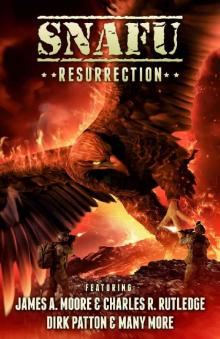 SNAFU: Resurrection
SNAFU: Resurrection The Awakening
The Awakening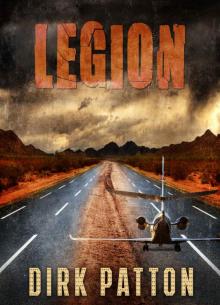 Legion: V Plague Book 19
Legion: V Plague Book 19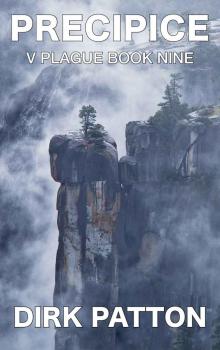 Precipice: V Plague Book 9
Precipice: V Plague Book 9 V Plague (Book 13): Exodus
V Plague (Book 13): Exodus Recovery: V Plague Book 8
Recovery: V Plague Book 8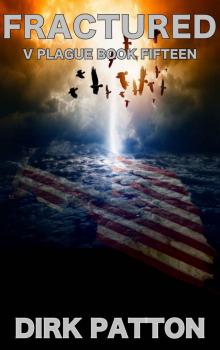 Fractured: V Plague Book 15
Fractured: V Plague Book 15 36: A Novel
36: A Novel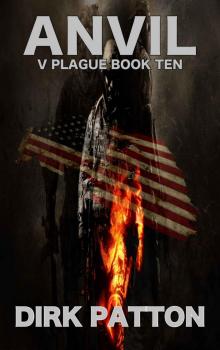 Anvil
Anvil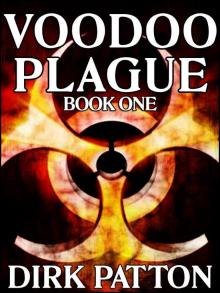 Voodoo Plague - 01
Voodoo Plague - 01 Crucifixion - 02
Crucifixion - 02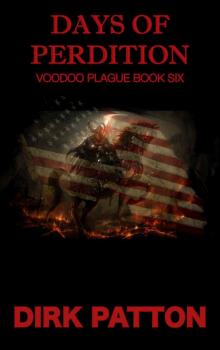 Days Of Perdition: Voodoo Plague Book 6
Days Of Perdition: Voodoo Plague Book 6 Indestructible: V Plague Book 7
Indestructible: V Plague Book 7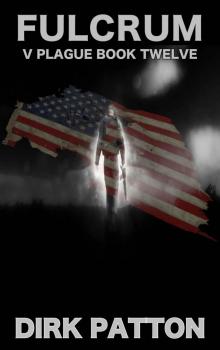 Fulcrum: V Plague Book 12
Fulcrum: V Plague Book 12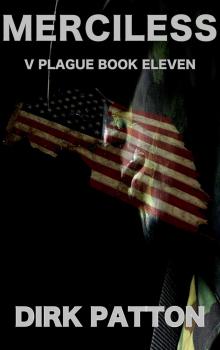 V Plague (Book 11): Merciless
V Plague (Book 11): Merciless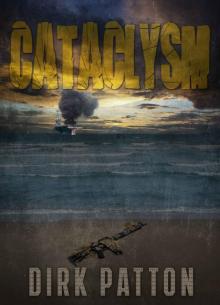 Cataclysm: V Plague Book 18
Cataclysm: V Plague Book 18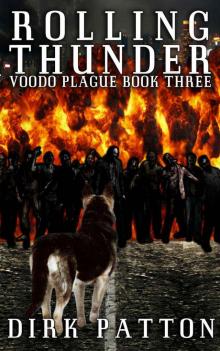 Rolling Thunder - 03
Rolling Thunder - 03 Red Hammer: Voodoo Plague Book 4
Red Hammer: Voodoo Plague Book 4 Exodus: V Plague Book 13
Exodus: V Plague Book 13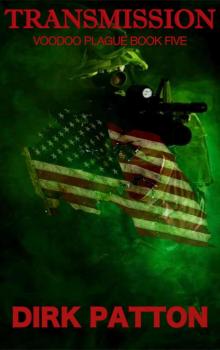 Transmission: Voodoo Plague Book 5
Transmission: Voodoo Plague Book 5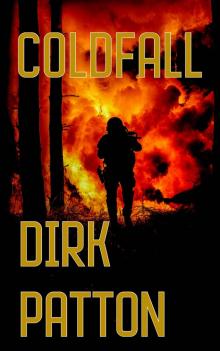 Coldfall
Coldfall Scourge: V Plague Book 14
Scourge: V Plague Book 14 V Plague (Book 16): Brimstone
V Plague (Book 16): Brimstone Brimstone: V Plague Book 16
Brimstone: V Plague Book 16